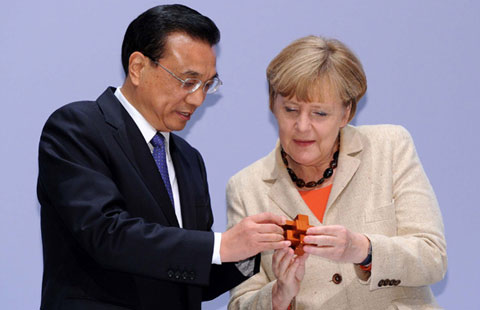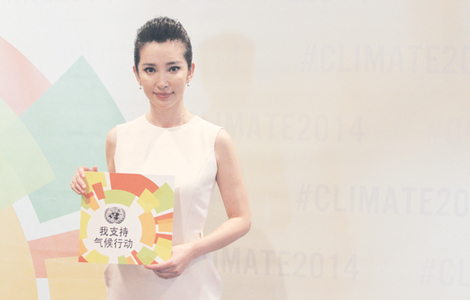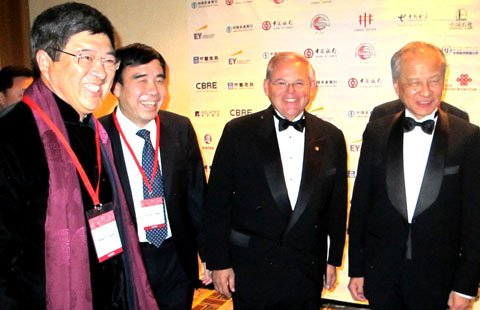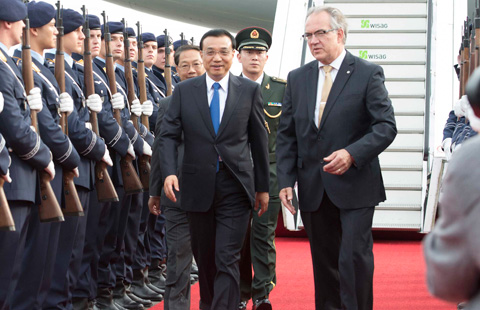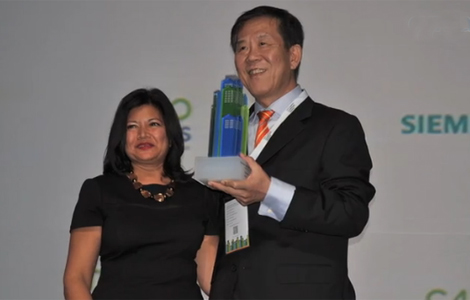Premier pushes innovation on German visit
Updated: 2014-10-10 04:04
By
ZHANG CHUNYAN in Berlin and ZHAO SHENGNAN in Beijing
(China Daily)
|
||||||||
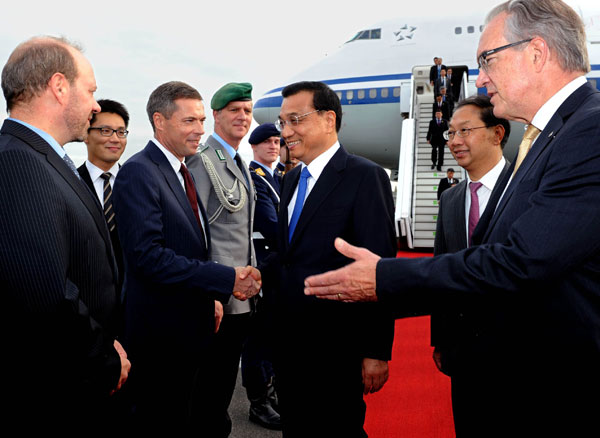 |
|
Premier Li Keqiang arrives in Berlin on Thursday for a visit during which he will hold talks with German Chancellor Angela Merkel. [Rao Aimin / Xinhua] |
Landmark bilateral cooperation program poised to cover the next 5 to 10 years
Premier Li Keqiang, starting his second visit to Germany on Thursday since taking office, aims to maximize Sino-German ties through a unique "innovation program" to help China’s economic transformation.
Besides a large number of business agreements to be signed during his trip, innovation will be a leading theme for a landmark Sino-German cooperation program over the next five to 10 years.
This program will cover and map the future for bilateral cooperation in areas including industry, science and technology, agriculture, education, environmental protection, urbanization, medical treatment and social welfare.
The program document is scheduled to be signed after the third China-Germany governmental consultation, co-chaired by Li and German Chancellor Angela Merkel on Friday.
Shi Mingde, China’s ambassador to Germany, said that nearly 20 Chinese ministers led by Li and at least 13 ministers from Germany will take part in the meeting - "a joint Cabinet meeting" to showcase the high-level ties.
Diplomatic sources said the program includes more than 100 cooperation proposals and projects. More than 10 intergovernmental agreements and commercial contracts scheduled to be signed will cover areas including energy, agriculture, aviation and space technology, car manufacturing and mobile communication.
Bjorn Conrad, associate vice-president for research and director of innovation and environmental research at the Mercator Institute for China Studies in Berlin, said China is making great efforts to increase its innovative capacity, and in some areas can learn from Germany’s experience.
China faces huge pressure in its economic transformation as well as environmental and social challenges. Germany is the country’s biggest European partner in trade, investment and technological cooperation, with bilateral trade exceeding $160 billion in 2013.
Celina Chew, senior China representative for German chemical and pharmaceutical company Bayer, said, "Our innovative solutions address some of China’s core challenges, such as helping bring new medicines and diagnoses to China.
"These address the great need for better healthcare, safe and healthy food for all and solutions for an energy-efficient infrastructure for transportation and construction.
"We are optimistic about the Chinese market. Today, greater China is Bayer’s third-largest single market globally and the first in the Asia-Pacific region," Chew said.
"We have successfully developed our business activities here and we are committed to continuing to invest in this market to bring the most innovative technology and products to China and support the idea of turning ‘Made in China’ into ‘Created in China’."
Meng Hong, an expert at the Center for European Studies at Renmin University of China, said Germany is keen to increase cooperation with China as the European country’s economy faces a slowdown due to the lingering European debt crisis and recent unrest in Ukraine.
"Innovation is an ideal approach. The concept is not confined to technologies, but means more about innovation in mindsets, systems, as well as communication and problem-solving," Meng said.
Contact the writer at zhangchunyan@chinadaily.com.cn
Most Viewed
Editor's Picks

|

|

|

|

|

|
Today's Top News
HK govt shelves talks amid protests threat
Sino-US trade ties are assured
Investment treaty tops agenda
Waldorf sale to spur more purchases by Chinese
China needs more than GDP
Beijing to keep the lid on air pollution for APEC
Premier pushes innovation on German visit
Li arrives in Germany, first leg of Europe trip
US Weekly

|

|
